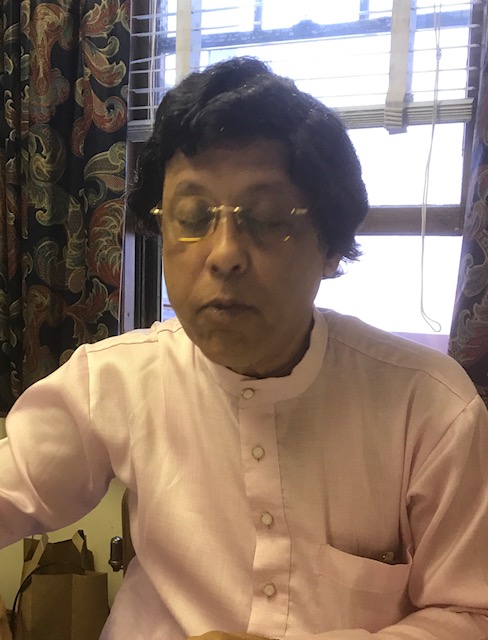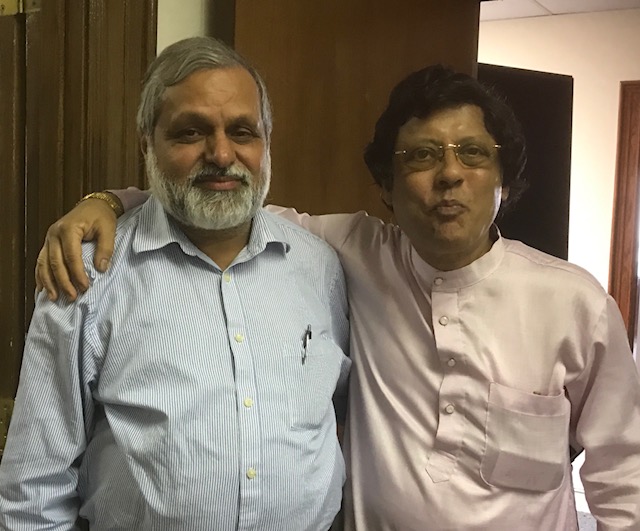Contribute
| Spreading The Love For Playing The Tabla…… |
Shuchita Rao
10/12/2017
The renowned tabla maestro Pandit Anindo Chatterjee conducted a tabla workshop organized by Learnquest on September 23, 2017. Later in the afternoon, he regaled audiences with a solo tabla recital at the Government Center at Waltham. Pandit Chatterjee and his son Shri Anubrata Chatterjee will visit Learnquest on a regular basis to groom students in the art of playing the tabla. For inquiries about tabla lessons at Learnquest please contact admissions@learnquest.org Pandit Chatterjee spoke to Shuchita Rao about his journey as a tabla artist. Q. At what age did you start learning to play the tabla? A. There is a photo in my house that shows me with my hands on the tabla when I was possibly nine months old. I started lessons at the age of 3-4. My father and uncle were practicing musicians. I have two brothers and a sister. My sister Keka learned to play the sitar from Pandit Indranil Bhattacharya. There was music in my family so my music education started automatically at a very young age. Q. At what age did you give your first public performance? A. I was given an opportunity as a gifted child artist when I was ten years old. It was at the Sadaarang music festival in Kolkatta. My recital was before the great vocalist Ustad Amir Khan took stage. He was pleased with my performance and blessed me. He said “This boy will go very far.†Q. Tell us about your Guru and the gharaana you belong to. A. My Guru was the multi-talented genius Padmabhushan, the late Pandit Jnan Prakash Ghosh. He sang and also played the harmonium and tabla. He was a musicologist and also a great composer. He accompanied great vocalists like Ustad Bade Ghulam Ali Khan and Ustad Amir Khan. In fact, the greatest of musicians lived at his house when they visited Kolkatta. Renowned vocalists like Pandit Ajoy Chakraborty and Pandit Arun Bhaduri sing his compositions. I had the opportunity to learn from my Guru for 30 years till he passed away in 1997. I learned the style of not just Farrukhabad gharaana but other gharanas like Lucknow and Punjab from him. In fact, Pandit Ravi Shankar used to say that I should say I belong not to Farukkhabad gharana but to Pandit Jnan Prakash Ghosh Gharana. Q. What would you say was the most unique aspect of your Guru’s teaching style? A. My Guru groomed many disciples. Each disciple has his own signature style. Kanai Dutt, Shankar Ghosh, Shyamal Bose, Malhar Ghosh – each disciple played different from the other. My Guru recognized the strength of each disciple and guided them in developing that strength. Q. You have been playing tabla for a long time. How would you say that your style has evolved over a career spanning more than three decades? A. I think my thinking and musical approach changed over time. All good artists change over time. When understanding of art increases, no matter what you practice, whether you play the sitar or sarod or tabla or you sing, your intonation, your ability to experiment and your overall experience deepens. Q. The speed of your hands and fingers has always impressed the audience. What are your thoughts on that aspect of tabla performance? A. In my younger days, I used to play with great speed. I have slowed it down and do not play fast as much because I understood that playing fast does not mean playing well. Ustad Ahmedjaan Thirakwa never cared about playing at great speed. Playing fast has meaning only when clarity and intonation is maintained. One must focus on those aspects of tabla performance more than playing at great speed. Q. What are your thoughts on the role of institutions like Learnquest when it comes to music education? A. I have taught at many institutions in Europe, England and Australia. I can tell you that Learnquest is a very different kind of institution. The atmosphere here is special because the faculty and the administrators at Learnquest have great love for music. All leading musicians know that and love Learnquest because of that reason. Q. You have achieved great fame as a tabla artist; is there something remaining in life that you aspire for? A. There is no new fame to be achieved through my playing the tabla. I know I play well and will continue to play well – it will never become bad. I have traveled all over the world and have achieved recognition. For the next 10 years I want to focus on my students. 20 out of 100 tabla students may have potential to become good artists. If I can train those 20 properly, our Sangeet (music) will prosper. Many people have interest but may not be destined to become Pandit Samta Prasad or Ustad Ahmedjaan Thirakwa. My Guruji developed the talents of many of his disciples. I wish to do the same. My son Anubrata, an established tabla player will help me with this responsibility of spreading our music. Q. What would you say are your favorite foods? A. I have a sweet tooth and love sweets and desserts. I must be careful because I am diabetic. It is human nature to want that which is denied to you. I am fortunate that my well-wishers understand my weakness for sweets and make desserts for me using artificial sweetener. Q. Had you not been a tabla player, what career may you have pursued? A. I am crazy about boxing and football and can watch the sports matches 24 hours a day. I like to play the tabla when I watch the matches being telecast on TV. Had tabla not chosen me, I might have been a boxer or a football player.
You may also access this article through our web-site http://www.lokvani.com/

